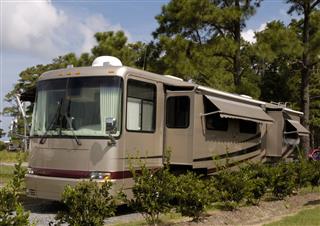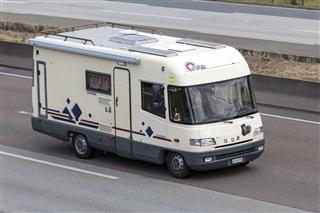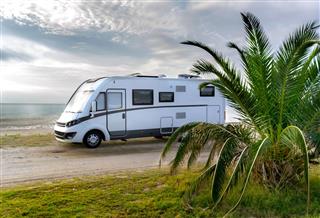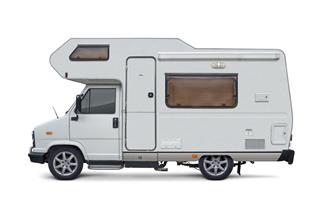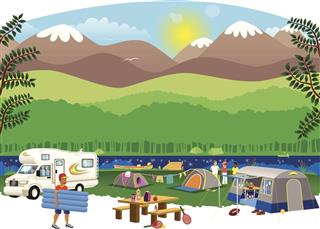
Since RV owners are always on the move, it is imperative that they know how to safeguard their vehicle from unforeseen natural calamities. Here are some tips on how to prepare your RV for a hurricane and protect your home on wheels.
Useful Tip
You can board up the windows of your RV with plywood so as to prevent it from blowing out or shattering during a hurricane.
Nature’s fury has a knack of catching you off-guard; hurricanes are no exceptions. Hurricanes pack enough punch to destroy everything in their wake and in those times, it is best to be prepared for an immediate evacuation. Your RV can become your best friend and your ticket to safety, if you make the effort to take certain safety measures for both, yourself and your vehicle.
When faced with a possible hurricane, your recreational vehicle can help transport you, your loved ones, and your home to a safer place. Category I and II hurricanes are unpredictable to a large extent and must not be treated lightly. It is also unadvised to stay in the RV and weather the storm, in case the meteorologist source warns that the impending hurricane is expected to reach category III or above.
This WheelZine article suggests some safety measures that must be taken in order to ensure that you and your RV can stay safe when faced with a lower category hurricane.
Preparation and Safety Measures
Vehicle Safety Measures
➜ The first thing you must do as soon as you become aware of an incoming storm is to prepare for all eventualities. Secondly, fill adequate fuel, keep some extra fuel ready, and check the engine to know whether it is running smoothly.
➜ Most importantly, take precautionary measures such as, ensuring that the wiring is shockproof and functional.
➜ Make sure to install fire alarms and detectors for gas and carbon monoxide leakage.
➜ You must also ensure that the holding tank is emptied, and the regulator, air conditioner unit, along with vents are covered properly, and the propane valves are turned off.
➜ Check for cracks on the windshield and seal it as soon as possible.
➜ Make sure that the wipers and lighting system of your RV is functioning properly.
➜ Check the tires and refill air in case the pressure is low. If need be, replace the tires immediately if they seem worn out and not up for the task.
Stock Emergency Supplies
➜ Make sure that you stock your RV with a medical kit and prescribed medications, oxygen masks such as CPAP, plenty of drinking water, and imperishable provisions, food, and drinks.
➜ Have adequate water stored for the next week or more, which will be needed for personal use. Another advantage of storing lots of water inside the RV is that it will add to the overall weight of the vehicle, and thus make it harder to be swept off by water or wind.
➜ Keep handy items such as tarps, ropes, sleeping bags, flashlights and extra batteries, candles and extra lighters, disposable garbage bags, NOAA Weather Radio, and a toolkit ready at all times.
Protect the Insides of the RV from Leakage
➜ You can count on the fact that water will find its way into the vehicle through tiny openings and leak all over the place. That’s why, you must keep your mattress as waterproof as possible by covering it with a tarp or waterproof cover.
➜ Try to seal these leaks wherever possible and save yourself any further trouble.
➜ Keep as many pieces of sponge as possible, as these will come in handy, to keep the RV relatively dry from the inside.
Secure Documents from Moisture
➜ Ensure that all important documents such as insurance and vehicle registration papers, among others are sealed in waterproof containers or bags.
➜ Also, make sure you have access to these papers, so you do not risk losing them or forget where you kept them.
➜ Always keep backups of these documents and make multiple hard and soft copies of each document. In case your RV is damaged in any way during the storm, the vehicle’s insurance policy ought to cover the damages to an extent.
Use Hurricane Tracking Maps
➜ You can take the help of hurricane tracking maps and applications as well as keep actual maps close by, so as to steer yourself away from the areas where the storm is headed and likely to strike.
➜ Try to inquire from the local people about the safest place to seek refuge during a hurricane. It would also be wiser to accompany the others, in case they all are trying to make an exit from the place.
Evacuate On Time
➜ Some people have this misconception that they can drive their way out of a surge storm.
➜ If you have been asked to evacuate, leave as soon as possible and do not decide to stay put.
➜ Since water levels are bound to rise during hurricanes, the safest thing to do is to drive several miles away from the areas that are likely to experience storm surges and heavy winds.
➜ Having a head start of 48 hours before the hurricane actually hits landfall is a sensible thing to do.
➜ With winds raging at 73 miles per hour and more, it would be unwise to wait around and weather the storm in your RV.
Plan Multiple Emergency Routes
➜ In case you are visiting a site that is vulnerable to hurricanes, it is best to chalk out multiple evacuation routes that can be taken in case a storm does begin to brew.
➜ Also, consider meeting other fellow RV owners at a common destination after evacuating, so as to ensure that everybody is fine and has made it out safely.
Study the Topography
➜ It is absolutely essential that all RV owners are aware of the terrain they are about to visit or currently parked at.
➜ It is important that you scout the area and search for places that are higher than the ground level and suitable for parking your vehicle for the next few days.
Park Your RV Safely
➜ While parking the RV, ensure that it is not parked in swampy or sandy areas, as the heavy rainfall might cause the tires to get stuck in the mud.
➜ Do not leave any items lying around outside the RV, as these can cause severe damage to the vehicle in high speed winds.
➜ In case you decide to park your RV on higher ground and evacuate your family elsewhere, make sure that the vehicle is anchored properly. Similarly, ensure that you tie down your travel trailer.
Apart from preparing your RV for hurricanes, you must also keep your emergency contact person informed about your whereabouts and keep adequate money in hand, in case ATM machines become damaged.










